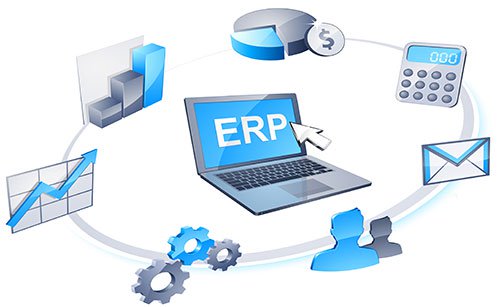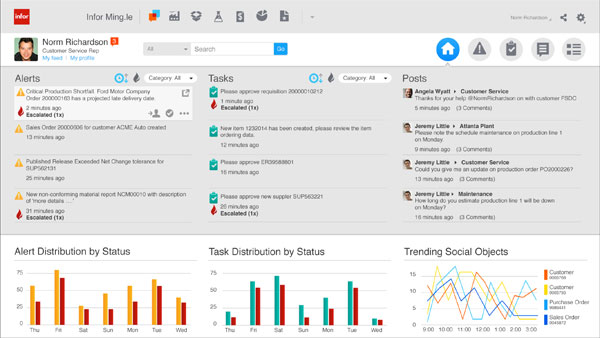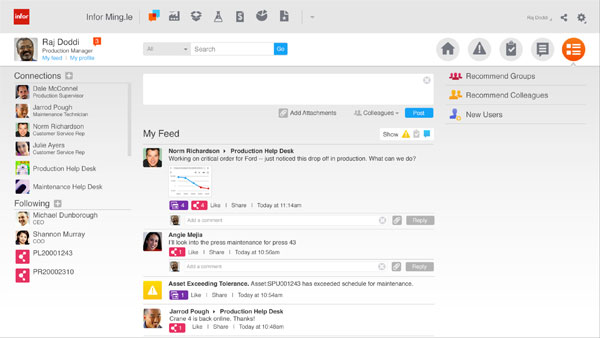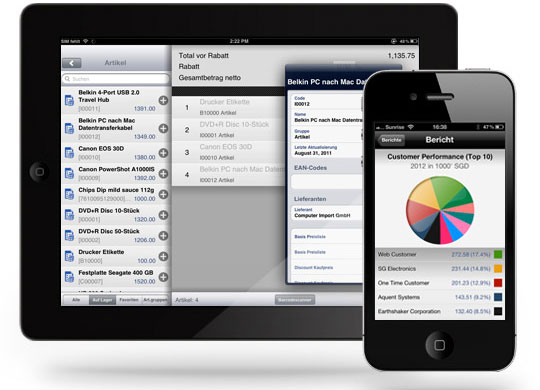Learn about ERP, versatile management software for businesses
Enterprise resource planning software, or ERP for short, is a software solution that has been around for a long time with the aim of supporting the management of a company. This software is not used by individuals but will help businesses in their daily activities, hence the word 'Enterprise' in its name.

The main function of ERP is to integrate all departments, all functions of the company in a single computer system for easier monitoring, but also flexible enough to meet many other needs. together. In other words, you can imagine ERP as a huge software, it is capable of doing things in finance, human resources, manufacturing, supply chain management and a lot of other things. Recently I have researched on ERP, and although it is software for businesses, but I am willing to share with you some more information about this interesting software and people use it in life as how.
What is ERP?
Before I get started, I want to talk briefly about the history of ERP. The word first appeared in 1990 when Gartner Corporation used it to expand MRP (Manufacturing Resources Planning), which is also a management software but focused on producing goods. By the mid-1990s, ERP was applied to almost every part of a business, not just for the production side. Government agencies and NGOs also started ERP applications. By around 2000, the term 'ERP II' appeared and was used to refer to ERP software capable of using the web interface to access and use. ERP II allows not only the company itself but also customers and partners in the supply chain to view the information. In other words, this new generation of ERP supports collaboration between companies, not just internal management.
Often in businesses, each department will use a different type of software. When using each app individually as the traditional way, connecting data together is difficult, especially when large amounts of data or software are not compatible with each other, so the coordination between multiple parts of one The company becomes difficult, expensive, time consuming. ERP then gathers all these things together and only uses a single database so that everyone, every department can access and share data for each other.

Let's take the example when a customer orders a laptop. Normally, when the person starts an order, the order will be transferred from that person's mailbox to the company. After that, the data entry staff will transfer the contents of the order (quantity, item, price, shipping cost, configuration of CPU, RAM, HDD .) to the company's computer system, forward it through for the customer management department to record information about the person who placed it, then transfer it to the warehouse, then accountant, etc. This process makes delivery to the buyer delayed, not to mention the loss of the single more goods. The need to import data from one software to another can generate errors, especially for companies operating in many geographic areas.
At the same time, no one in the company really knows the status of that order because there is not enough access to all software. A person who works on the financial side or assists customers how to access the software of the warehouse to know if the goods have been delivered or not, that warehouse is located in Binh Duong while the employee is in the city. What about HCM? That is why many times when you call to ask if your goods have been delivered or not, the receptionist must forward you through the warehouse, and then you must repeat your entire query request, very costly time.
ERP appeared to replace all these single systems, and the company only used one software to manage. Of course, ERP will be broken down into packages depending on the purpose, such as financial packages, personnel packages, warehousing packages, etc. but the fundamental problem is that data is in one place, not dispersed in Here a little, there a little. Every employee who needs it (and of course, when he has enough authority) can see the information as he wants, and more importantly, the director who sits on a high level can still grasp his business situation in a way Quickly without waiting for dozens of reports from many parts posted up for a long time. A company can only buy a certain number of packages depending on their capabilities and needs, not having to buy the whole set (because they may not need it), but in the 1990s, ERP was a 'bureau'. 'It is big to force the company to buy the whole set very expensive.
In addition, the ERP system will be customized according to the needs of each company because each business will have different requirements, different processes. And not only can the packages be customizable, but each form, toolbar, location buttons, data filling areas . can also be tweaked to best suit. In other words, ERP possesses extremely high flexibility, and this is also the main job of companies deploying ERP to their customers.
Video description of activities of ERP:
How can ERP help companies?
The biggest hope for ERP is that it can improve order processing as well as things related to revenue, profit, invoicing . These are things called 'fulfillment process', And also for this reason ERP is often called an "back-to-back software" for the office. In the last 10 years, there have appeared a number of modules to manage customers, but before that ERP only focused on automating the different steps in the operation of the manufacturing company.

When an employee enters the order information, he will have all the information needed to complete the order. In addition, all other relevant employees can update information and can track the progress of an order anytime. ERP provides a 'magic' that helps customers get what they buy faster because information is less late, fewer errors, and that 'magic' also applies to other activities such as employee payroll calculation. or create financial statements.
In short, there are some areas where ERP can help companies as follows:
Control customer information: as mentioned above, because data is shared in a place where all employees in the company can access and view customer information, some rights holders can change information that does not fear customer records are not updated throughout different departments. Even a CEO can easily see who buys what where and how much.
Speed up the process of production and supply of goods and services: ERP can serve as a tool to automate part or all of production processes, from preparation of materials to finished products. , manage output inputs, packaging and more. Because only a single computer system is used, the company can save time, reduce costs, increase productivity and reduce the amount of personnel needed. Managers can view all the company's parameters in a single interface, not jump from one area to another just to earn a few numbers. I know an ERP conference for manufacturing businesses is coming on March 26, if you are interested, you can click on this link to register and see more information.

Quality control, project management: ERP helps enterprises check and monitor product quality uniformity, and plan and allocate human resources reasonably according to project needs. I know that ERP can also automatically check in the database to see which strengths are available and assign them to each task of the project, the manager does not have to spend much time on this stage. .
Control of financial information: how to understand the performance of your company, managers will have to learn data from many different departments, sometimes having the right, the wrong, having the standard hey, there's something else according to the standard. ERP synthesizes everything related to finance in one place and data has only one version, negatively limiting as well as misjudgment of managers about the performance of the enterprise. ERP can also help create financial reports according to international standards such as IFRS, GAAP, and even according to Vietnamese Accounting Standards (TRG International Company in Vietnam is also editing the software suite. Infor ERP LN by Vietnamese standards)
Inventory control: ERP helps to control how much stock is in stock, where the goods are located, and how much material remains. This helps companies reduce the materials they store in the repository, only when necessary to add them (Planning letters in ERP Italy just help businesses plan their activities, and this is a wallet example). All will help reduce costs, reduce the number of people needed, speed up the work speed.
Standardize human resource activities: thanks to ERP, HR can closely monitor working hours, departure hours, how much work each employee has done (to calculate wages and benefits. ), even if those employees work in many different departments, in different geographical areas. Employees are also happier because with ERP, companies can pay them more on time.
Communicate, socialize the communication in the company: Do not think that the corporate environment does not need a social network, is actually there, and it is very useful in communicating among employees of departments together. . I know there is a platform called Ming.le that allows people in an ERP system to chat with each other in real time to query information, just like when you chat on Facebook. The director can quickly chat with the storekeeper to ask how many items X is left, check the results right in the web interface and then tell the director immediately. Not to mention that ERP also has the ability to display tasks that a person needs to do, view status updates from roommates, .

Interface area of social interaction on Infor's ERP system
The above are just some typical applications, but in fact, ERP has the potential to be extremely wide applications that I cannot tell all.
Types of ERP
We can mention some popular ERP software such as SAP ERP, Infor ERP LN, Oracle E-Business Suite. These are 3 names ERP 'famous' and their suite of software targeted at medium and large companies. I know that Boeing has Infor ERP LN and thanks to this system they can successfully produce and market the 787 Dreamliner. Infor also has more than 4500 customers, from medium-sized companies to TOP500.
Smaller businesses can use Dynamics ERP from Microsoft, ERP from IBM and a number of other brands. Some Vietnamese software companies also sell ERP to outside companies. However, the above solutions require a lot of money, ranging from a few tens of thousands to millions of USD. Therefore, if small companies or shops want to use ERP, they can use free open source ERPs on the Internet, such as Adaxa, ERP5, JFire, OpenERP, WebERP . Of course, customized With business needs will be very difficult if businesses do not have enough professional knowledge.

In addition to software installed on PCs and web platforms, ERP vendors have also added mobile versions for their applications. SAP, Infor ERP LN and a number of other major companies all offer applications to help corporate employees review information anytime, anywhere, even when on the street and not with their laptops. You only need a smartphone to be able to understand the activities of your company or store.
In terms of ERP implementation, companies such as Microsoft, SAP, Infor also have representatives to sell and deploy software depending on customer needs. However, it is only a very small part, and most firms will shake hands with partners (third-party companies) to sell, refine ERP as well as integrate ERP into their daily operations. career. The time to deploy ERP may take only a few months, but it may take up to a year.
Limitations of ERP
Let's go back to the individual software of each part as mentioned above. The process of using such sporadic software may not be effective, but it is simple. App for the financial side, take care of the finance, the app for the personnel side is worried about the personnel, the trouble that happens outside the software is not the department's problem, it is the trouble of others . As for ERP, this is no longer the case. An input officer does not simply type in the information and then press Enter. This person will see the relevant information of the customer, such as whether or not the person pays for what they have just purchased, how much of that person's credit rating, the person used to buy those What, and maybe they will have to update this information too. The warehouse must also update information on the Internet (or intranet) regularly, but they not only work with the paperwork as before. If they do not, the screen on the side of the contact with the customer will show that there is no such thing as the customer wants, thus losing the opportunity to make money.
In addition, people often don't like to change, while ERP requires them to change their way of working to adapt to the new system. This is also one of the reasons why ERP projects fail to integrate and apply into practice but rarely fail due to lack of money or other financial problems. In fact, changing software is not as important as the employees in the company change themselves to take advantage of the software. ERP helps companies save a considerable amount of money compared to performing manual work, but if you simply install the software and leave it and don't change the way you operate, you're just paying money only. In addition, you may be slowing down everyone's progress, because you are replacing software that people are accustomed to using a system nobody will (or no one can) use.

I also learned about a restriction on ERP when talking to an expert, also about people. Because ERP is transparent, everything is managed by the system, so corruption is unlikely, and this makes some individuals in the company refuse to use new software. Incorporating ERP can help businesses and customers, but make these employees lose their 'out-of-stream revenue'. This is also something that companies are very worried about because it leads to the failure of an ERP integration project.
And yet, ERP also has certain limitations even with its own modules. There are some companies that only use ERP but cannot meet their needs, so they use one or more other software (such as accounting software, for example) to ensure smooth operation. howl Then, the biggest problem is how to make ERP integrate well with these external solutions, from data exchange to workflows. Of course, this is not easy.
In addition, one reason ERP often fails when deploying, although businesses have spent a lot of money, they are leaders who are not familiar with the system. They only know their needs, and direct them down to the IT side. The IT side is not clear about the business process as well as business requirements, so it is difficult to implement. Having to deal with this concern, the new ERP really benefits as it is.